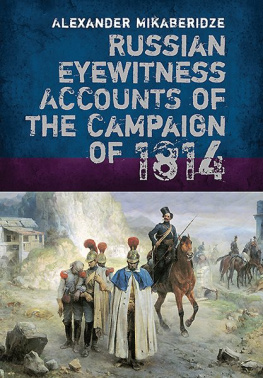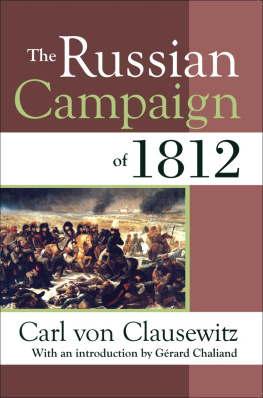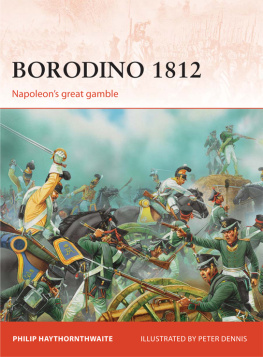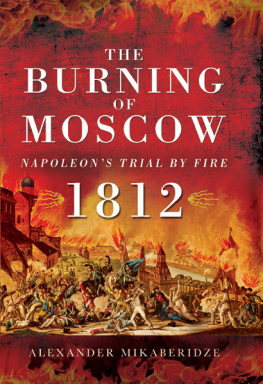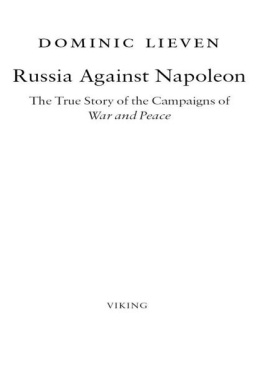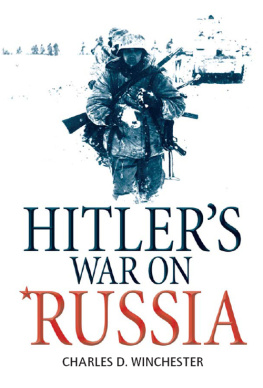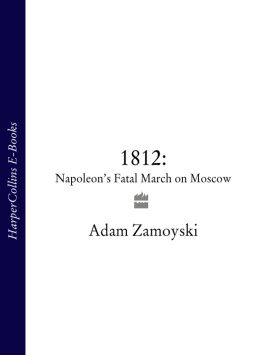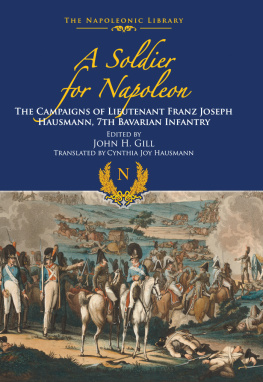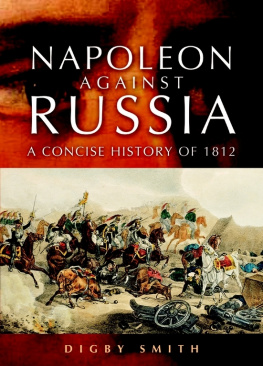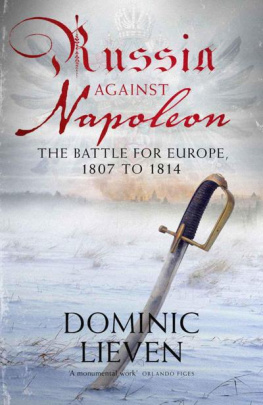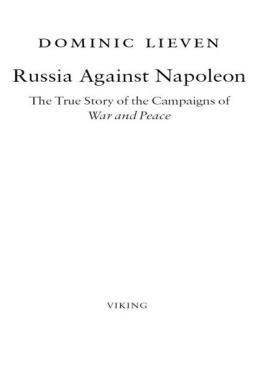DOMINIC LIEVEN
Russia Against Napoleon
The Battle for Europe, 1807 to 1814

ALLEN LANE
an imprint of PENGUIN BOOKS
ALLEN LANE
Published by the Penguin Group
Penguin Books Ltd, 80 Strand, London WC2R 0RL , England
Penguin Group (USA) Inc., 375 Hudson Street, New York, New York 10014, USA
Penguin Group (Canada), 90 Eglinton Avenue East, Suite 700, Toronto, Ontario, Canada M4P 2Y3
(a division of Pearson Penguin Canada Inc.)
Penguin Ireland, 25 St Stephens Green, Dublin 2, Ireland
(a division of Penguin Books Ltd)
Penguin Group (Australia), 250 Camberwell Road, Camberwell, Victoria 3124, Australia
(a division of Pearson Australia Group Pty Ltd)
Penguin Books India Pvt Ltd, 11 Community Centre, Panchsheel Park, New Delhi 110 017, India
Penguin Group (NZ), 67 Apollo Drive, Rosedale, North Shore 0632, New Zealand
(a division of Pearson New Zealand Ltd)
Penguin Books (South Africa) (Pty) Ltd, 24 Sturdee Avenue, Rosebank, Johannesburg 2196, South Africa
Penguin Books Ltd, Registered Offices: 80 Strand, London WC2R 0RL , England
www.penguin.com
First published 2009
Copyright Dominic Lieven, 2009
The moral right of the author has been asserted
All rights reserved.
Without limiting the rights under copyright
reserved above, no part of this publication may be
reproduced, stored in or introduced into a retrieval system,
or transmitted, in any form or by any means (electronic, mechanical,
photocopying, recording or otherwise) without the prior
written permission of both the copyright owner and
the above publisher of this book
ISBN: 978-0-14-194744-0
For my courageous wife, Mikiko, and in memory of the
regiments of the Imperial Russian Army who fought, suffered
and triumphed in the great war of 181214
Acknowledgements
So many people and institutions helped me to research and write this book that in normal circumstances it would be difficult to know where to start with my thanks. But the help of one institution, the Leverhulme Trust, was so fundamental that beyond question it must come first. In 2006 I was awarded a Leverhulme Major Research Fellowship, which left me free to work on my book for the next two years and also funded most of my research in the Russian archives. I owe a huge amount to the generous support of the Trust. Professors Paul Bush-kovitch, William Fuller and Geoffrey Hosking supported my application for the fellowship, and to them too I owe many thanks.
In the summer of 2006 I had a two-month fellowship from the British Academy which enabled me to work in the Slavic Library in Helsinki. During these two months I was able to read all the regimental histories of Russian units which participated in the Napoleonic Wars. I also read or at least copied all the journal articles published in Russia before 1917 which were relevant to my topic. For any historian of imperial Russia the Helsinki Library is a unique asset, made all the better by the friendly and efficient help of its staff, led by Irina Lukka. My deep thanks are owed not just to Irina but also to Ulla Tillander, who helped so much to organize my expedition and make it pleasant. Richard Stites and the community of historians working in the Library were also very kind to me.
One part of the Russian State Military Historical Archives (RGVIA) holdings on the Napoleonic Wars was microfilmed shortly before I began my research. This is Fond 846, the so-called Voenno-uchenyi Arkhiv (VUA). As anyone looking at my references will see, it contains priceless information for my book. The Librarian of the LSE Library (BLPES), Jean Sykes, and the Librarys main Russian specialist, Graham Camfield, acquired this immensely valuable collection, and left me for ever in their debt.
Even so, the main archival sources for my book had to come from holdings in the Russian State Military Historical Archive (RGVIA) in Moscow other than the VUA. Above all these were the papers of the wartime recruit levies (Fond 1), most of the materials relating to the feeding, equipment and arming of the field armies (Fond 103), the documents of the Reserve Army (Fond 125), and the immensely useful personnel records of Russian regiments (Fond 489). Thanks to Tatiana Iurevna Burmistrova and the staff of RGVIA, I was able to get through all the materials I needed during my six research trips to Moscow.
I would never have been able to do so, however, without the help of Vasili Kashirin. My research was complicated by family needs and by the fact that for part of this time the archive closed for repairs, sometimes with minimal notice. Without Vasilis help in finding materials and ensuring that I received them this book would be much weaker than it is. More than any other individual, he made an enormous contribution to my research. A number of archivists also deserve my special thanks, and not least Aleksandr Kapitonov. Professor Apollon Davidson and his wife Liudmilla kindly put me up in Moscow on a number of occasions and coped with my grumpiness when something went wrong with the archive.
I owe a big debt to the friends who took me to battlefields. Viktor Bezotosnyi showed me the field at Maloiaroslavets, and was also a constant source of advice, information and friendship. Paul Simmons and Vasili Kashirin spent a memorable day at Borodino with me. Dominic Herbestreit and Christin Pilz took me around the battlefields of Leipzig and also drove me to Kulm, now in the Czech Republic. Even more heroic was my sister, Professor Elena Lieven, who drove me deep into rural Poland to the battlefield of the Katzbach. Our expedition was helped hugely by Alexandra Porada, who helped us negotiate the area.
My agent, Natasha Fairweather, has been a key ally and so have my publishers, Simon Winder and Wendy Wolf, as well as Alice Dawson and Richard Duguid of Penguin. Elizabeth Stratford was an exceptionally efficient copy-editor. I have wanted to write this book since childhood but they encouraged me to do so. I think that the initial spur to write the book in time for the bicentenary in 2012 came, however, from my colleague, Professor James Hughes.
Among others at LSE who helped me enormously, Sue Starkey stands out. She coped with my frequent hysteria when confronted by computers, photocopiers and other technological challenges. Her colleagues in the Government Departments General Office (Jill Stuart, Cerys Jones, Madeleine Bothe, Hiszah Tariq) also helped me and calmed me down. My colleague, Professor Janet Hartley, very kindly read the text for me and suggested changes. So too did our students, Conor Riffle and Megan Tulac. In my first twenty-four years at LSE I kept as far from the Schools management as possible. While working on this book, however, I was initially head of department and subsequently a member of LSEs governing council. That gave me some insight into the intelligent, efficient and good-humoured manner in which the School was run by (Sir) Howard Davies, its director. Tony (Lord) Grabiner, chairman of the Board of Governors, showed not just wisdom but great unselfishness, devoting an immense amount of his time to unpaid service to the School to a degree that few members of the academic community realize.
I must also thank Professor Patrick OBrien for his advice on war, finance and economic issues, and Alexis de Tiesenhausen for his help and advice as regards illustrations.
For the first eighteen months of my research I lived mostly off the excellent holdings of the British Library and owed much to the help of its staff. After joining the London Library halfway through my research, I discovered just how splendid a resource it is for scholars in general and historians of imperial Russia in particular.


